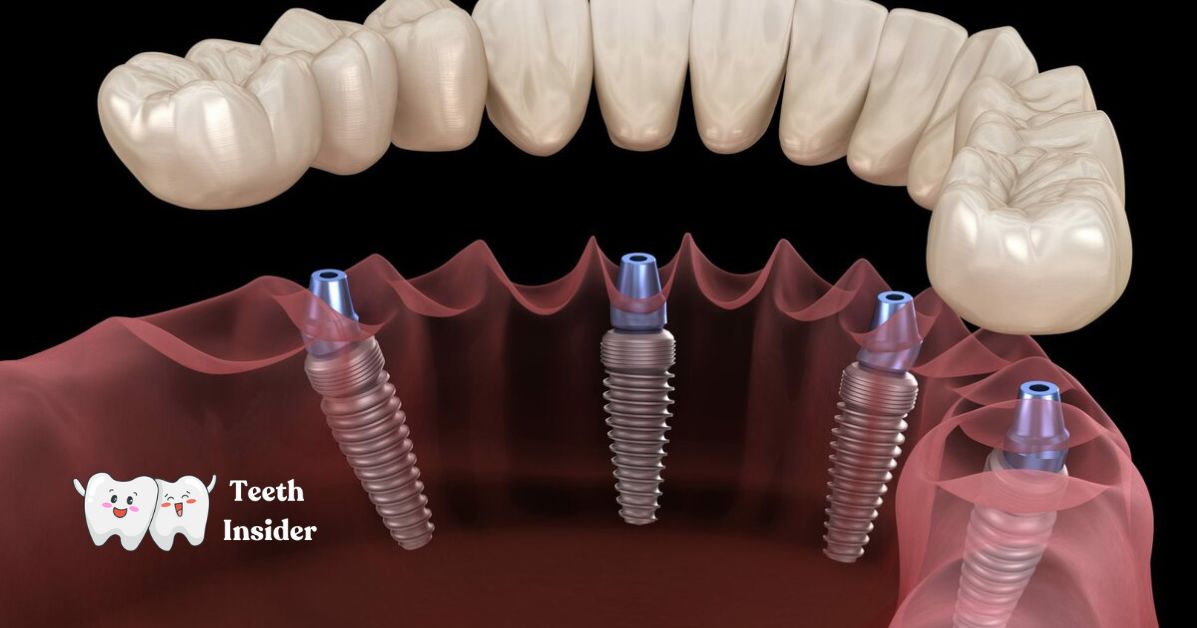Many turn to dental implants in their quest for a beautiful smile and functional teeth. All-on-4 dental implants are one of the more well-liked choices available. But are they permanent? Investigating this further will help us learn more about All-on-4 implants.
What are All-on-4 Dental Implants?
Dental implants placed all on four are a cutting-edge way to replace lost teeth. All-on-4 implants, in contrast to conventional dentures, are cemented into the jawbone, offering a strong base for replacement teeth. This novel approach is less intrusive and more affordable than regular implants because it only requires four implants to maintain a full arch of teeth.

Understanding Permanence
When we discuss dental implants’ permanency, we’re talking about their endurance and lifespan. Dental implants, such as All-on-4 implants, are intended to provide a permanent alternative to missing teeth. Implants are designed to endure for many years, maybe a lifetime with good care, unlike dentures, which may require regular adjustments and replacements.
Exploring the Benefits
Compared to conventional dentures, all-on-four dental implants have the following benefits:
Stability: All-on-4 implants offer a stable foundation for replacement teeth because they are fixed into the jawbone, improving speech and chewing abilities.
Aesthetic Appeal: Your smile will seem better and your confidence will grow back because these implants are made to feel and look like real teeth.
Improved Oral Health: By simulating the function of natural teeth, All-on-4 implants help preserve bone density in the jaw and prevent further degradation.
Convenience: All-on-4 implants offer a hassle-free alternative to removable dentures by doing away with the necessity for messy adhesives and regular removal.

Also Read: What Are Dental Implants? Types, procedures, and more
Addressing Concerns
Even though all-on-four dental implants provide many advantages, there are some things to be aware of.
Longevity: While All-on-4 implants are supposed to be permanent, factors including oral cleanliness, lifestyle choices, and overall health can influence their lifespan. Implants can endure for many years with the right maintenance and routine dental examinations.
Maintenance: To maintain their durability, All-on-4 implants need to be brushed, flossed, and seen by a dentist on a regular basis, just like natural teeth. Implant failure and gum disease are two consequences that can arise from poor dental care.
Risk of problems: All-on-4 implants carry a small but possible risk of problems, including infection, implant failure, and bone loss. To reduce these dangers, it’s critical to speak with a licensed dentist and adhere to post-operative instructions.
Comparison with Traditional Dentures:
The benefits of All on 4 implants over regular dentures are obvious. Conventional dentures may require regular adjustments and can be painful. On the other hand, All on 4 implants provide a stable and long-lasting solution that makes it simple for you to speak, eat, and grin.

Also read: When to Take a Pregnancy Test After Implant Removal? Complete Guide
Conclusion:
To sum up, all-on-four dental implants are a long-term fix for missing teeth. Compared to regular dentures, these implants offer many advantages and a natural look and feel. You can continue to have a confident smile for many years to come with the right upkeep and care.
Thus, why not give All on 4 dental implants some thought if you’re sick of putting up with the inconvenience of dentures? Embrace life with a self-assured smile and say hello to a lasting solution!
Also read: Why No Dairy After Dental Implant? Your Guide
Frequently Asked Questions (FAQs)
How Do All on 4 Dental Implants Work?
The robust anchor mechanism of All on 4 implants is what makes them so magical. By carefully positioning these implants in the jawbone, a strong basis for the replacement teeth is created. You may brush and clean them just like your original teeth, and there’s no need for adhesive like with dentures.
Are All on 4 Dental Implants Permanent?
Yes, it is true! Tooth loss has a permanent remedy with all-on-4 dental implants. The implants integrate with your jawbone to form a seamless, organic part of your body. This implies that you can eat your favorite foods worry-free and carry on with your everyday activities with assurance.
How do all-on-4 dental implants differ from single dental implants?
Unlike single implants, all-on-4 implants require fewer implants overall since they only require four implants per arch to support an entire set of teeth.
Am I suitable for all-on-4 dental implants?
A dentist can evaluate these and other criteria, including the state of your gums, jawbone, general health, and individual dental needs.
What does the all-on-4 dental implants procedure involve?
Usually finished in a single appointment, the process entails surgically putting four implants in the jawbone and attaching a specially designed set of prosthetic teeth.
How long does the all-on-4 dental implants procedure take?
The patient’s grin will immediately operate better and look better, usually in a few hours.
Does the all-on-4 dental implants procedure hurt?
Thanks to sedative alternatives and local anaesthesia, discomfort is kept to a minimum, making the procedure reasonably painless.
How long do all-on-4 dental implants last?
If given the right care, which includes consistent dental hygiene routines and yearly examinations by your dentist, they can last a lifetime.
What is the success rate of the all-on-4 dental implants procedure?
The success rate is high, usually between 95% and 98%, and most patients report better overall happiness and enhanced chewing ability.
How much do all-on-4 dental implants cost?
Costs vary based on a number of factors, including the dentist’s experience, the materials used, the location, and any extra procedures needed. Because of its intricacy, costs are usually greater than those of single implants.
For more information Click here.

